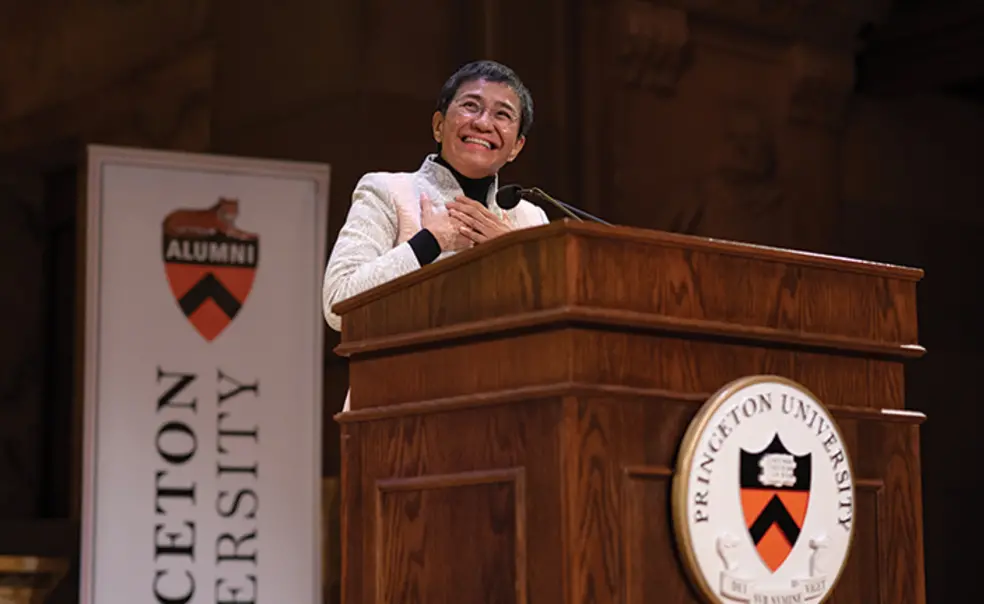Tigers Return for In-Person Alumni Day
‘The experience was exhilarating,’ said Gary King ’79
Christopher Eisgruber ’83 did not hide his enthusiasm. “Welcome, Tigers, to the first major in-person Princeton University alumni event in two years!” the president greeted Princetonians gathered in Richardson Auditorium for Alumni Day Feb. 19. “After all of this time apart, you are indeed a sight for sore eyes in your brilliant orange and bold black.” The audience cheered.
The excitement was unmistakable as alumni embraced, celebrated award winners, and honored lost classmates and friends at the Service of Remembrance. About 750 people attended the on-campus event, which was also livestreamed.
“The experience was exhilarating,” said Gary King ’79, who joined classmates for lunch and served as an usher at the Service of Remembrance. “To see a building filled with fellow alumni was very emotional,” he said. “Just to see people I haven’t seen in years, not by chance, but because we couldn’t.”
The day offered a glimmer of post-pandemic life, but the presence of COVID remained apparent: Masks were required indoors, the customary luncheon in Jadwin Gym was not held, and Pyne Prize co-winner Christian Potter ’22 — in isolation — spoke on Zoom.
Madison Medalist Julia Wolfe *12, a music composer who has won a Pulitzer Prize and a MacArthur “genius” fellowship, shared a snapshot of her creative process, presenting video snippets from three compositions. She spoke about the extensive research that goes into her pieces, including interviews and the review of historical records.
The work Fire in my mouth, for example, includes 146 female singers, matching the number of people who died in the 1911 fire at the Triangle Shirtwaist Factory. The piece “was an opportunity to recast the women not as voiceless victims, but as protagonists whose actions and sacrifices had a profound effect on the United States’ history,” Wolfe said.
When she learned she would receive the medal, she was stunned: “As an artist you aren’t generally celebrated in the company of scientists, economists, and historians.” But she wished the honor were named for someone other than James Madison, the fourth U.S. president and one of Princeton’s first graduate alumni, because he owned enslaved people. “Names and symbols carry meaning and weight,” she said.
Woodrow Wilson Award winner Maria Ressa ’86 began her lecture by noting she almost didn’t make it to the event. The Nobel Peace Prize-winning journalist said a Philippine court order initially prevented her from leaving the country and caused her to miss her originally scheduled flight. “You do not know what freedom feels like until you almost lose it,” she said.
When she landed the morning prior, Ressa went directly from John F. Kennedy Airport to her high school, Toms River High School North, to meet with students and staff. In a Q&A session, she told them: “Whatever you’re most afraid of, touch it, own it, embrace it. … If you can take the sting out of your fear, you are unstoppable.” In May, the school is planning to name its auditorium in her honor.
At Alumni Day, Ressa — the CEO of media company Rappler.com, whose journalists have been harassed and arrested under the authoritarian administration of Philippine President Rodrigo Duterte — reflected on Princeton’s Honor Code and the influence it has had on her work. She spoke about the spread of disinformation and its effects on democracy. Though she never set out to be an activist, she added, journalists must fight for facts when they are under attack.
She shared insights about a network of Philippine news organizations and supporters that are collaborating to combat disinformation by fact-checking incorrect claims. “The Honor Code is the foundation,” she said, “because it’s an appeal to every Filipino to pledge to work against corruption and lies and clean up each of our areas of influence.”
She closed with a plea to alumni to use their influence to fight for truth: “Don’t give up, because when you do you make all of us just a little weaker.”













No responses yet